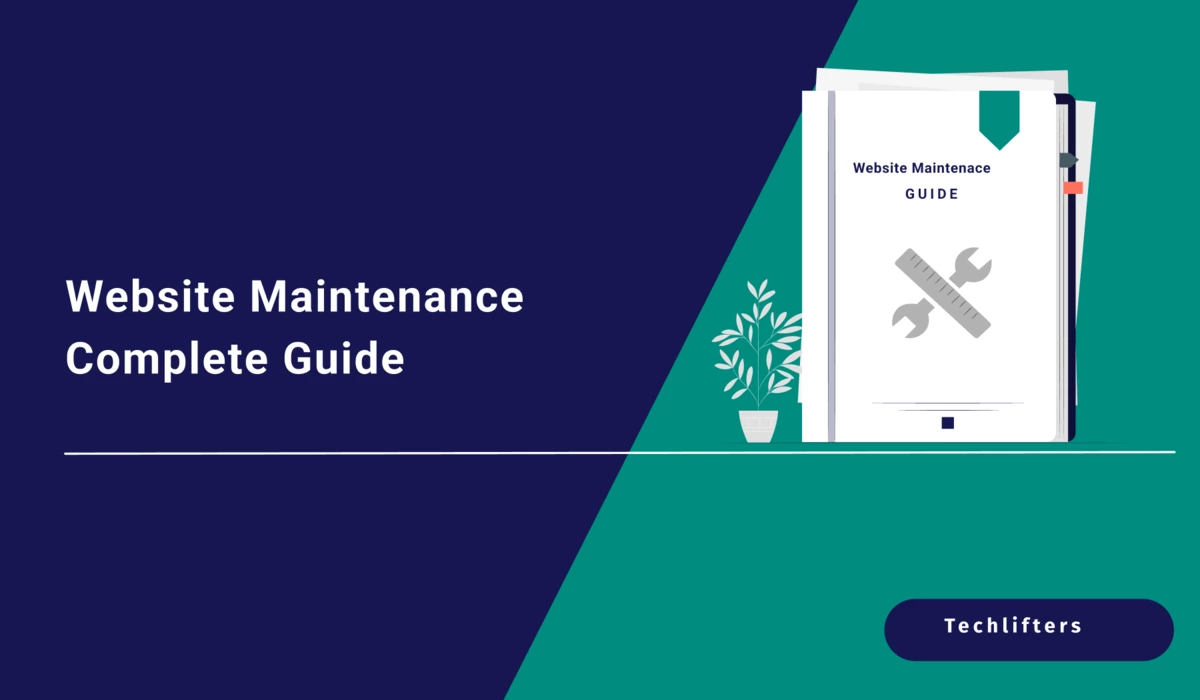Table of Contents
Introduction
With the continuously changing digital landscape, securing a robust online presence is essential for businesses.
They should be highly concerned about this to unlock the missed growth opportunities.
You should always keep your website up-to-date with the latest trends to keep it functional, high-performing, and relevant.
With regular website maintenance, you can check and resolve bugs, errors, and technical issues.
So, if you don’t know about website maintenance and how it’s performed, you are in the right place. You can explore a comprehensive website maintenance guide that includes all related and useful information.
Let’s start from the website maintenance basics.
What is website maintenance?
When it comes to website maintenance, it indicates several tasks including monitoring, regular updating, website management, and more to improve its optimal functionality.
It also strengthens the website’s security and performance. Professionals who offer website maintenance perform various important tasks like checking and fixing broken links, updating content, improving website speed, performing software updates, and implementing various security measures.
Opting for regular website maintenance is necessary to improve user experience, and performance and prevent various security issues including security breaches or outdated information.
Website maintenance is not a one-time process. It’s an ongoing process that aims to keep your website updated and secured.
Types of Website Maintenance Tasks
As we already mentioned, website maintenance is an ongoing process that encompasses a range of tasks endeavoring to make your website fully updated and high-performing.
![Website Maintenance Guide: [Types, Checklist, Tools] 1 types of website maintenance](https://www.techlifters.com/blog/wp-content/uploads/2023/12/website-maintenance-tasks-types-300x137.webp)
Let’s get into a couple of the popular website maintenance tasks in-depth.
1) Content Updates
Updating website content is necessary for keeping information up-to-date and relevant. A website includes varieties of content, including text, images, multimedia elements, and more.
Outdated content often includes inaccurate information and also hurts the search engine ranking of your website.
That’s why content updates are important. It involves various tasks like adding blog posts, new pages, etc. to keep the website fresh.
2) Optimize Performance
Performance optimization is an integral part of website maintenance. It offers a positive user experience.
It involves several tasks like optimizing images and website speed; minimizing unnecessary scripts, optimizing media files, images, etc.
A fast-loading website is essential to maximize user satisfaction and also improve search engine rankings.
3) Check and Update Security
Security checks of websites are vital to monitor for vulnerabilities, install security patches, and implement software updates.
It works great to prevent your website from potential threats, including security breaches, hacking attempts, malware, and more.
They implement the best practices including HTTPS, secure authentication, etc.
4) Backups and Recovery
When it comes to regular backups, these are necessary to tackle any sudden events including hacking, failures, or accidental data loss.
A powerful backup system is necessary to restore your website quickly to its previous state while reducing data loss, downtime, etc. Besides, website maintenance also involves implementing automated backup solutions to make the backup system more reliable.
5) Compatibility Testing
You can check website computability regularly to make sure the website functions properly across different devices and platforms.
Responsive design testing and practices on multiple browsers are useful to maintaining a consistent user experience.
6) Broken Link Checks
Broken links are always harmful to user experience and also hurt search engine optimization.
Therefore, you can check and fix broken links and ensure users can navigate the website without encountering dead links.
You can implement professional tools to automate the process when it comes to identifying several broken links.
7) Server and Hosting Maintenance
Regular website maintenance and monitoring of hosting and server infrastructure are necessary to ensure a website maintenance remains fully accessible and also can perform optimally.
It includes several tasks including addressing downtime quickly, managing server resources, and optimizing server configurations.
8) SEO Auditing
SEO auditing is another task that website maintenance includes. It’s necessary to keep the website fully optimized for search engines.
SEO audit includes various tasks like meta tag optimization, keyword analysis, and keeping up to date with the latest SEO practices.
9) Analytics and Feedback Analysis
Analyzing website analytics and user feedback is another task that is necessary for website maintenance. It helps you get complete details related to user preference and their behavior.
One can use this kind of details to make a decisive step related to the improvement of the user interface, content updates, and website improvements.
Importance of Regular Website Maintenance
The major benefits of website maintenance is to harness the maximum potential advantages of a website.
One of my clients runs an online eCommerce business that offers products like electronic items online.
His website was developed well and the online presence of his business was solid.
Initially, my client witnessed the marvelous performance of his website in terms of vast client engagement, increased sales, and revenue.
Meanwhile, with time, he noticed a decline in website traffic, customer acquisition, sales, and revenue. It was an alarming situation for the client and he finally decided to delve into it completely.
He approached us with this problem; we analyzed their website and found several issues. The content was older and had not been updated for a long time.
The website had a lot of issues such as lots of broken links, slow loading speed, security patches, and more. These were the actual reasons why the website was not ranking in search engines properly.
We suggested our client go for website maintenance after analyzing the website. The client consulted us to share more information about website maintenance in terms of its importance and benefits.
After knowing the importance, the client finally opted for our website maintenance services.
We strategized well and provided the best services to our clients who finally witnessed a great spike in the website’s SEO ranking, traffic, conversion rate, and ROI.
How to do Website Maintenance – Checklist
Regular website maintenance brings a wonderful opportunity for small businesses to strengthen their online presence and thus sustain the competition successfully. Let’s explore a complete website maintenance checklist, which makes your website up-to-date, secure, and user-friendly.
![Website Maintenance Guide: [Types, Checklist, Tools] 2 Website Maintenance - Checklist](https://www.techlifters.com/blog/wp-content/uploads/2023/12/website-maintenance-checklists-300x131.webp)
1) Regular Content Update
- Make sure your website content is up-to-date. You should update your product details, price details and related information.
- Add fresh and relevant content that engages a lot of visitors. It also enhances your search engine rankings.
2) Image Optimization
- Compressing and optimizing pictures to enhance page loading times as larger images can decrease the loading speed of your website.
- You can use several tools including ImageOptim, TinyPNG, and more to compress images without compromising image quality.
3) Identify Broken Links
- To check broken links, you should scan your website regularly by using some popular tools including online link checkers, Google Search Console, etc.
- Fixing broken is necessary to improve user experience and also to maintain proper SEO health.
4) Update Software and Plugins
- You should always keep your website’s content management system (CMS) and plugins up-to-date. It helps in resolving security issues and also ensures higher compatibility.
- You should check and update software regularly, especially during non-peak hours to reduce disruptions.
5) Mobile Responsiveness
- Make sure your website is responsive and can function properly on different devices with multiple screen sizes.
- Conduct testing of your website with several browsers and devices to check whether it offers a seamless experience to users.
6) Backup Websites
- You can take regular backups of your website to prevent data loss, especially in case of any unexpected security breaches.
- Always use some reliable backup tools and also store your website’s backup in several locations.
7) Analyze Website Speed
- Use tools like Page Speed Insights, Google, and others to analyze the loading speed of your website.
- Optimize various elements like JavaScript, CSS, and images to enhance the overall performance.
8) Analyze Security
- You should scan your website regularly to check for malware and also certain security issues.
- You should implement an SSL certificate to ensure a secure connection. You should also update your passwords for FTP accounts and admin.
9) Review and Update Contact Details
- Check contact information including phone details, emails, etc.
- You should update necessary changes quickly to ignore any potential communication issues with users.
10) Review Analytics
- You should analyze your website analytics regularly to understand popular content, user behavior, conversion rate, and more.
- To make a fully informed decision related to marketing strategies and content updates, use proper insights
Frequency of Website Maintenance
Business must have a proactive approach to website maintenance. Be it a regular schedule or a systematic approach to keep the website running properly, it includes everything. All you need to do is to go through a website maintenance guide that includes frequency of website maintenance.
1) Daily Tasks
1.1) Quick Content Checks
You should check content on a regular basis to ensure all information is accurate and up to date. Be it contact information, product details, or blog posts, this kind of information includes everything.
1.2) Security Scans
Security should be the top priority, especially with the constantly increasing number of cyber threats. So, you can conduct security scans even daily to avert any kind of threats. You can check and update security plugins, check malware, etc.
2) Weekly Tasks
2.1) Software Updates
Software components are something that websites rely on. So, you should update various crucial software components weekly be it plugins, content management systems, or themes.
2.2) Backup Procedures
Being a small business owner, you should always implement powerful security procedures. Besides, you should also take backups on a bi-weekly or weekly basis.
3) Monthly Tasks
3.1) Performance Audits
A performance audit of the website is necessary every month. It helps you find issues that affect the performance of your website. You can resolve these issues quickly to improve the performance of the website.
3.2) Comprehensive Content Review
Small businesses should review content at least monthly to check how effective their content strategy is. It involves analyzing product descriptions, blog posts, and several other types of content.
Best Website Maintenance Tools or Software’s
![Website Maintenance Guide: [Types, Checklist, Tools] 3 Website Maintenance Tools or Software's](https://www.techlifters.com/blog/wp-content/uploads/2023/12/website-maintenance-software-tools-300x147.webp)
It’s certainly not easy for every business to hire an in-house team for website maintenance as it involves heavy costs.
Therefore, it’s essential to go through an ultimate guide for website maintenance and know the right tools or website maintenance software’s that they can use for website maintenance. Let’s explore all these tools in detail.
1) Google Analytics
Google Analytics comes first when it comes to high-grade website maintenance tools. It helps you understand user behavior by providing an in-depth insight into user demography, website traffic, popular content, etc. This information helps you make a data-driven decision and improve user experience and website performance.
2) UptimeRobot
UptimeRobot is another website maintenance tool that ensures the accessibility of your website every time. It’s crucial to maintain a good user experience.
As a website monitoring tool, it notifies businesses in case their website experiences downtime. It enables businesses to take fast action to resolve all issues while minimizing disruptions.
3) Yoast SEO
As a WordPress plugin, Yoast SEO is vital when it comes to increasing the online visibility of any website.
With the tool, a small business can optimize their website content for search engines by getting crucial advice to improve certain SEO elements including titles, meta, keyword usage, etc.
4) Hotjar
Hotjar is one of the vital tools for website maintenance that helps you know how users interact with the website, which is necessary to make an informed decision.
It offers complete insights through several features including session recording, heatmaps, surveys, and more as one of the top-rated user analytics and feedback tools
5) Trello
Trello helps you manage your website maintenance tasks most effectively. Those who have a small team can find Trello as a good option.
It helps businesses in organizing tasks better being a versatile management tool. Besides, Trello also ensures a full collaboration while streamlining website maintenance activities.
Key Factors to Consider While Doing Website Maintenance
In today’s era of cut-throat competition, small businesses can’t take any chances when it comes to website maintenance. So, while performing website maintenance, you can consider various crucial factors.
1) Check Security Updates
It’s one of the crucial things that your website maintenance strategy includes. Cyber threats are increasing at a fast pace and creating lots of challenges for websites from a security point of view.
Updating your software, frameworks, plugins, etc. is crucial. You are advised to analyze your security forums regularly that will help you stay informed about potential security threats.
2) Analyze Website Speed
You need to keep in mind website speed and performance have a significant impact on user satisfaction and search engine rankings.
Optimizing the performance of your website includes various tasks like minimizing code, compressing images, leveraging browser cache, etc.
Regular performance monitoring and also improvements tend to contribute to a fast and smooth user experience while minimizing bounce rate and improving SEO.
3) Review Content
You need to understand that fresh and important content is necessary when it comes to acquiring and retaining visitors. While performing website maintenance, you should review content and update it regularly.
You should also check certain outdated information, broken links, etc. If you keep your content up to date, it enhances your user experience and also impacts positively in search engines.
4) Website Backup and Recovery Procedures
Data loss happens due to server failures, security breaches, etc. Regular website backup and recovery procedures are highly important. You need to also ensure backup files are restored properly.
Besides, you should also conduct a test of the restoration process periodically when it comes to guarantee that backup copies are important and also can be deployed fast, especially during a crisis.
5) Analyzing User Feedback and Analytics
You should always focus on analyzing website analytics and user feedback. These are crucial sources of information for ongoing improvements.
Tools like Google Analytics are vital to gather details about popular content, user behavior, and the way users interact with the website.
One can combine quantitative data that comes from analytics with qualitative insights from user feedback. It helps you understand the performance of your website.
6) Test Mobile Responsiveness
A website maintenance task also includes checking the responsiveness of websites on various devices with different screen sizes.
It’s something that involves checking font size, layout, functionality, etc. to provide an outstanding experience to mobile users. A responsive website can easily rank in search engines.
7) Legal Compliance
Make sure your website adhere to various legal standards and regulations, be it cookie consent, privacy policy, or accessibility guidelines. You should review these elements regularly to ensure your website adheres to the latest laws.
How to select Best Website Maintenance Company
Selecting the best website maintenance company is a highly responsible task. So, one should not take it lightly. It impacts directly when it comes to making your online business successful. Let’s discuss some of the factors you can keep in mind when choosing a website maintenance company.
1) Experience
The first thing you should keep in mind when selecting a website maintenance company is to check their overall experience.
Make sure the company you are hiring for website maintenance has enough experience in this field.
The reason is only an experienced website company can cater to your needs by providing top-quality solutions.
2) Expertise
The next thing that you need to keep in mind is the expertise of the company. You should ensure the company possesses a proven track record and should be aware of the intricacies of different platforms and industry-specific requirements.
You should always check the portfolio of the company. It helps you gather details about their past works. Experienced professionals are fully equipped with several challenges, troubleshooting issues, and more.
3) Comprehensive Range of Services
As we all are aware, website maintenance encompasses a range of services including security monitoring, content updates, bug fixing, and performance optimization.
So, when you opt for a website maintenance company, make sure they offer a range of services. The best company should be capable of addressing security patches, daily updates, and implementing SEO practices.
The service provider should be capable of ensuring your website is fully functional and aligned with the latest trends and standards.
4) Security Measures
Security is something that keeps great importance and also has become a great concern, especially with the increasing cases of cyber threats. So, your website maintenance plan should include it.
A reputed website maintenance company always emphasizes and in fact, implements cutting-edge security measures to provide full protection of websites.
Your website maintenance company should be familiar with the latest security trends and technologies to safeguard your website.
5) Support and Response Time
A website can encounter issues at times. So, if you don’t respond on-time, it can have a negative impact be it on user experience or the credibility of your business.
So, you should know about the response time of the company before hiring them. Besides, you should also get details about their support mechanism.
A trusted service provider is always ready to respond 24/7.
Conclusion:
So, after going through the above website maintenance guide, you already understand the importance of website maintenance and how it’s performed.
Irrespective of the type and size of the website, you can implement the above practices to ensure its proper maintenance.
You should proceed with a proven strategy and implement the latest trends to get the desired outcomes.
FAQs
1) Why to opt support a website maintenance Company?
Opting for support from a website maintenance company offers several benefits for businesses. Some of these benefits include vast expertise, time-saving, regular updates, security, technical support, search engine optimization, performance optimization, responsive design, cost-effectiveness, and more.
2) How does website maintenance help in website success?
A website maintenance company ensures the success of your website by performing several activities such as regular software update, security audit, fixing broken links, optimizing speed, updating content, updating keywords, implementing the latest security features, and more.
3) When should you redesign a website?
Redesigning any website is something that depends on several factors. Some of these factors that give you an indication of redesigning your website include outdated design, changing brand identity, poor UI/UX design, outdated technology, conversion issues, integration of new features, and more.
4) How much does it cost yearly to maintain a website?
On average, the yearly website maintenance cost in India ranges from Rs. 20,000 to Rs.50,000. Meanwhile, the cost tends to vary based on multiple factors including, size, complexity, and hosting provider of the website.







